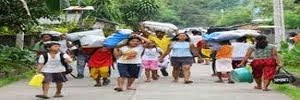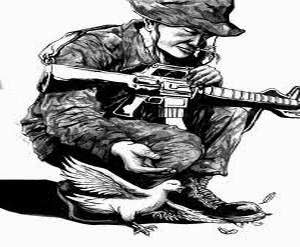
From the Website of GPH - Government of the Philippines
links: http://www.gov.ph/2016/03/31/pnoy-25th-anniversary-center-for-communityGGtransformation/
President Aquino speaks at the 25th anniversary of Center for Community Transformation
Speech
of
His Excellency Benigno S. Aquino III
President of the Philippines
at the 25th anniversary celebration and thanksgiving program of Center for Community Transformation
[Delivered at Wack Wack Golf and Country Club, Mandaluyong City, on March 31, 2016]
I understand Ruth [Callanta] asked Dinky [Soliman] earlier whether or not I still remember her. And I said, how can I forget one of my bosses in PBSP, which was my first job. So I guess some of you knew we were together there. Some of you, I think, will know that we’re not of the same generation. [Laughter]
But there is one story that I want to share: When I was first told that there was an invitation to join you in this gathering, I said it would be a nice occasion to see Ruth again, renew our friendship. It’s been quite a while since I last saw her. I was computing earlier, the time that I met her is longer than your anniversary tonight. [Laughter]
Anyway, I’m sure she does not remember this, but can we just take you back to those years: In 1983, my father was assassinated. I thought my main function then was to justice. I knew we wanted to finish the work my dad had not finished. I knew we wanted to get democracy back. I really had serious doubt whether the peaceful mode of regaining our democracy will still have a chance. Those of you of my generation, a little bit over, will remember that Davao was already turning into the urban laboratory for the Communist Party of the Philippines. Some of you will remember the group “Life of Fire” in the April 6th movement, which were not traditional leftist organizations but actually peopled by some who have gone to even the most establishment of schools like Harvard who also said, “There seems to be no hope for attaining a peaceful transition back to democracy.”
It was in this context that my mother said that to a large sense that what she wanted was for us to get back to some semblance of a normal life. I was the only son—I think you will understand—who was at this point in time perhaps committed to the Old Testament of the bible rather than the newer Testament. I really felt that my dad’s attempt at trying to reach a reasonable dialogue with the dictatorship was welcomed by the treachery that befell him at the airport.
Anyway, the story that I want to say—just to make this dialogue not that heavy—is that one day, I found myself talking to Ruth. I was a young man then. I was seriously attracted by this young lady, and I asked her. I did find out that she and her husband was both student activists. [In the struggle], would it be fair to get a party not directly involved in the struggle that we are in? To have a relationship with this person, given the fact that I really believe the dictatorship would probably end the same way dictatorships have ended elsewhere, which is through a bloody revolution. I guess in Tagalog it says it a lot better: Binati ka, madadamay mo pa dito, obligasyon mo ba na huwag na siyang idamay?
So I asked her opinion, and then she said, “On the one hand, finding the right partner really does [mellow] you down. But on the other hand, you drive strength, inspiration, you are able to accomplish that which you need to do with that significant other beside you.” And I really took that to heart. And I did embark on that relationship. Of course, I want to state for the record that I don’t blame Ruth for the fact that I’m still a bachelor at this time. [Laughter] She had nothing to do with that. And the cousin actually that I asked the same question too, the way he said it was “Problems come to us without any control, nor inputs, nor desire from us. If on the other hand, we do get the chances to be happy and we force ourselves not to be happy, then there must be something wrong with an attitude like that. I’d like to think that I have in Ruth a kindred spirit, and I really felt compelled to come tonight in the sense that I met her through PBSP which is a social development foundation.
I’d like to say the same for Dinky Soliman. Dinky, when I was talking to her and Ruth to a certain degree, they embody the same traits of people. One day I told Dinky, “You know, I really admire you and your department. You’re a department that has to confront problems on a daily basis, 24/7. All other departments can have a problem today, can be [strolling] a success the following day, or can even have a problem in the morning, a solution in the afternoon. However, in your chosen advocacy, it seems at times to be a never ending quest. How do you actually sustain your self to keeping up with the same drive and energy?” And of course, we were together, Ruth and I, in PBSP in 1984, which is 32 years already and she’s still at an even bigger sphere. I’d really like to say thank you to Ruth, thank you to Dinky. There serve as a very important catalyst for the things that we really are trying to do.
Earlier, Mr. Bertram Lim said that I have interest in the poor. You know, I’d phrase it is I don’t really believe in trying to create divisions. Some are rich, some are poor; some are successful, some are failures. When we say “rights for the women,” I say, “Shouldn’t the rights be enjoyed by everybody all the time?” So what I’d like to say is, and the way we phrase it is, we always say “Walang maiiwan.” What does that basically mean?
Anybody who is left behind becomes a problem not just for themselves but for everybody else. In the same token, the only real token is one that is all-encompassing and all-inclusive. If we leave somebody behind, we all get dragged down; we bring somebody up, we all get lifted up. I’ll be preachy to the choir if I continue with this message.
Let me go to the specific messages that I’d like to show to tonight. Again, talking about Ruth and these people like her, and my father, people who have done everything in their power to alleviate the suffering of others to whom we owe our thanks. This is the part that Butch Abad always breaks out in a smile because I’m about to quote the bible. They prove that, as Luke 1:37 says, “With God, nothing will be impossible.” Injustice can be vindicated; oppressive regimes, ended; communities, transformed. Their work—both of them and so many of us—has helped us to realize a society in which being our brother’s keeper no longer has to be fraught with danger; a society in which love for our fellowmen can be freely expressed through public service and civic work alike.
It goes without saying that I am very happy to see that all of your work has continued through the Center for Community Transformation (CCT). I would like to think that Ruth will always associate herself with like-minded people—and I believe that your 10,000-strong force of community volunteers and leaders, built over 25 years, is proof positive of how much can be accomplished when we make the greatest commandment our life’s mission; when in being our brothers’ keepers we do choose to act by paying it forward.
A single year in the quarter-century that you have been active can give us an adequate picture of your efforts. In 2015 alone, we saw you helping communities in disaster-struck areas by providing housing assistance to 294 families, boat loans to 840 fisherfolk, and livelihood assistance to 2,637 families. In that same year, 48,096 men and women were covered by your Savings and Credit Association, [applause] while 23 centers began operations to serve the various needs of communities.
At this point, can I just digress a little and say that when I’m also in the campaign trail these days, and when we say “What does Daang Matuwid mean for your respective provinces,” one of the challenges is trying to rekindle the memory of everybody of the transformation that has been brought to the society, which basically means giving out a list of what improvements have happened—whether it is the number of schools, beneficiaries of Pantawid Pamilya, membership in PhilHealth, the infrastructure and so on. Just describing it is already a lengthy process.
Actually, detailing all of the projects becomes the difficulty. I think this last week, I had a seven-page speech and about five pages were devoted to just listing what has been accomplished. So when I tend to go through fast about these numbers, I realize all of the achievements we have just mentioned did not happen overnight, and [were] the result of so much commitment. I do not mean to belittle the efforts of everybody here but I really want to say that you have done so much. And again, perhaps we in government are obligated to do so. You obviously are just obligated by your sense of volunteerism and community and of being of service to God. And for that, again, I offer you my most sincerest thanks.
Of course, I am well aware that the impact you have had on Filipino society goes far beyond these mere figures. There are the fathers and mothers you empower through microfinance to operate their own small businesses and provide for their families’ needs; the communities to whom you give free education and health services; the families whose spiritual lives you have strengthened through your ministry. In reaching out to our brethren in the margins, you yourselves have become pathways to the Lord; you have helped them to renew their faith in others and in Him and in themselves. We remember Matthew 25:35: “For I was hungry and you gave me food, I was thirsty, and you gave me drink, I was a stranger, and you welcomed me.” For what is faith, but a promise that we will never be forsaken?
If during the Martial Law regime, Ruth and others like her found it difficult to do their work and uplift communities; today, I tell you, that government stands by you. We will empower you; we will work with you. And we have been empowering and working with you. Indeed, by forging stronger partnerships, we can merge our skills and capacities, for the benefit of our countrymen. For example, the Conditional Cash Transfer (CCT) Program, our flagship anti-poverty program, should be familiar: Not only do you share the same acronym, you have also contributed to its success. Under our Conditional Cash Transfer Program, household beneficiaries receive cash assistance in exchange for fulfilling the conditions of sending their children to school and ensuring they receive the necessary vaccinations and attending medical check-ups.
In 2013, your CCT partnered with the DSWD to implement the Program for Livelihood and Transformation (PRO-LIT), giving participants access to credit, savings, and micro-insurance for MSME development. Apart from that, as an extension of your own project, you also partnered with a TESDA-accredited institute to provide training in carpentry, plumbing, masonry, and electrical installation and maintenance. All of these fields, by the way, I’m told, are so full of vacancies that a lot of our very well established construction companies have urgent hiring needs for the categories we just mentioned.
I believe that PRO-LIT is only a three-year program, which means that it is slated to end this year. We hope that I will not be putting too much pressure on you when I say that a worthy way of celebrating your 25th anniversary would be to extend this partnership and reach even more beneficiaries. Should you need further convincing, which I highly doubt, let me relate to you an especially significant achievement: Preliminary findings from an assessment of households conducted by the DSWD show that more than 1.5 million families, or around 7.7 million Filipinos, have already been lifted above the poverty line, thanks to the Conditional Cash Transfer Program. [Applause] With your help, we can continue this trend.
Perhaps, I should also ask for your assistance when we embark on the next phase of this. Of course, the program is for those at the bottom quintile of our population.
The question is: What happens to those that have just breached the poverty threshold, the category that is now called the “near poor”? “Near poor” is defined as the household that with just one calamity striking or one disease taking hold of them, they are reverted to living below the poverty line. So the next programs are how to push them away further and further away from the poverty line. The programs that will address the needs of the near poor are the next on the agenda, and again, at this point in time, may I solicit your support for that forthcoming program.
After examining your organization’s track record, I was extremely pleased to see that you did not limit your work only to your namesake in government. Another example: I am told that the DSWD has accredited your boarding schools in Puypuy and Magdalena, Laguna, which serve as homes to street children, while their parents transition away from life on the streets and get back on their own two feet through livelihood opportunities provided by your Kaibigan Ministry.
We could go on and on, but a lengthy speech is neither the point of our gathering, nor the reason I am here tonight. I am here simply because I want to thank you for the work that you have done and continue to do; I join you because I want to celebrate twenty-five years of the meaningful transformation you have wrought in so many Filipino communities. In the moments when the burden of my office weighs heavily on me, it is being and praying with people like you that refresh me and renew my strength and hope. I always promised to leave the Philippines in a far better state than the one in which I found it, and I believe that I will do just that when I step down in 91 days. Yet, no matter how great our successes these past few years, I can still admit to a little bit of worry that those who want to return us to the old and corrupt systems will succeed.
That worry somehow has dissipated each time I stand in front of audiences like this—each time I travel around the country and meet Filipinos who have seen and who have contributed to the positive change that is sweeping the nation. There is relief in the knowledge that you stand with us in the agenda for continuity; that, like us, you are not willing to let your hard work—work that has redounded to the betterment of so many of our countrymen’s lives—go to waste. You and all other Filipinos doing their part to build our nation every day are proof positive that, no matter what happens next month or in the years afterward, there will be always men and women who choose to tread the straight path, fight the good fight, and work for the benefit of all Filipinos.
And if I may end in this manner, there was a woman we came across—a beneficiary of our 4Ps program in Pampanga. She narrated her life story in a few paragraphs during one of our rallies there. She said that she is the mother of seven children, her husband has abandoned her, she had—the way she phrased it in Tagalog was “Nagtitinda-tinda ako.” What does that actually mean? Sometimes she does sell, a lot of time perhaps she is not able to sell. Bottomline, there was no fixed income for them. No way to help raise her seven children. She credits the 4Ps program as having helped her get three of her children educated past the high school level, who are now all gainfully employed and now permanent employees.
When I go around these days, I think her story encapsulates that which we are trying to do, why we say there has to be continuity. I ask the crowds that I am fortunate to talk to, “If this woman was here present and she tells us ‘You have helped me raise my three children to the point that they are now productive citizens; I still have four. You have helped me without unduly burdening anyone; the taxes you have paid have funded government efforts towards helping me. I have utilized this opportunity to get a better life for all of us. I still have four children that are left. You can continue to help again and again without actually having to unduly burden anyone, just to what has to be done.” She might ask all of us if [she] will be for us.
I’m at the stage where light is really shining upon us. We ask, “Will you continue to shine that light on us, or will you leave us here after we had hoped that finally we could have a better life?” I’m sure the people in this room and your other colleagues will definitely say “Yes, we will not leave you. We will continue assisting you until such point that you are ready to take hold of your entire nation.”
Again, my thanks for your 25 years of service. Hopefully, you will go not just from the strength of the path but rather, more and more successes down the line.
Thank you. Good evening.
GPH Website
Article links:
http://www.gov.ph/2016/03/31/pnoy-25th-anniversary-center-for-community-transformation/
http://www.gov.ph/2016/03/31/pnoy-25th-anniversary-center-for-community-transformation/
OTHER HUMAN RIGHTS PROMOTIONS WEBSITES
PROTECTION AND PROMOTION OF HUMAN RIGHTS
-----------------------------------------------------------------------------------------------
------------------------------------------------------------
-----------------------------------
























0 comments:
Post a Comment